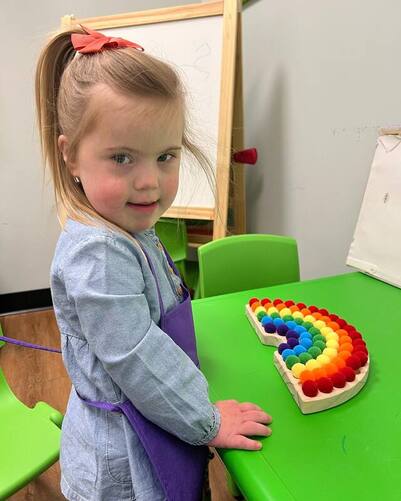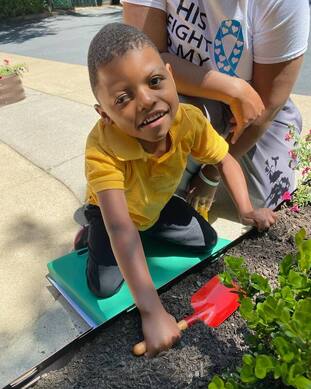
Milestone uses sensory integration therapy techniques and a multidisciplinary treatment approach to provide the most effective treatment for your child. This section will provide a brief overview of sensory integration as well as provide possible indicators of sensory processing disorders.
Sensory Integration Therapy at Milestone utilizes occupational therapy and/or physical therapy to provide a multidisciplinary treatment approach for children who have trouble making use of sensory information. Therapy is designed to help a child attain his greatest potential for development and learning. An important part of development is the ability to organize information coming from the senses such as smell, taste, touch, sight, hearing, and movement. Sometimes information from the senses is not received and organized correctly by a child's nervous system, and this results in an inability to develop, learn, and behave normally. Trouble in the organizing of information is called sensory integrative dysfunction. If there is just a small deficit in sensory integration, the child's problem may appear as slow speech development or as a learning disability. Larger deficits, however, may be correlated with autistic spectrum disorders.
Sensory integrative therapy approaches neurological problems in children by first evaluating the way the child's brain is organizing sensations. Then the therapists guide the child into therapeutic activities that produce sensory information and encourage its organization. These activities are based on normal development and are usually very fun for the child. The younger the child, the better he/she responds to therapy because the brain is more flexible and easily changed. Therapy is provided by an occupational or physical therapist specially trained in sensory integrative techniques. Therapy helps to improve gross, fine motor, speech and social skills, cognitive and academic abilities, self-confidence and self-esteem.
Sensory Integration Therapy at Milestone utilizes occupational therapy and/or physical therapy to provide a multidisciplinary treatment approach for children who have trouble making use of sensory information. Therapy is designed to help a child attain his greatest potential for development and learning. An important part of development is the ability to organize information coming from the senses such as smell, taste, touch, sight, hearing, and movement. Sometimes information from the senses is not received and organized correctly by a child's nervous system, and this results in an inability to develop, learn, and behave normally. Trouble in the organizing of information is called sensory integrative dysfunction. If there is just a small deficit in sensory integration, the child's problem may appear as slow speech development or as a learning disability. Larger deficits, however, may be correlated with autistic spectrum disorders.
Sensory integrative therapy approaches neurological problems in children by first evaluating the way the child's brain is organizing sensations. Then the therapists guide the child into therapeutic activities that produce sensory information and encourage its organization. These activities are based on normal development and are usually very fun for the child. The younger the child, the better he/she responds to therapy because the brain is more flexible and easily changed. Therapy is provided by an occupational or physical therapist specially trained in sensory integrative techniques. Therapy helps to improve gross, fine motor, speech and social skills, cognitive and academic abilities, self-confidence and self-esteem.

Possible Indicators
Clumsy, poorly coordinated
Overly active, inattentive, impulsive
Underachiever in school
Poor peer relations
Low endurance, under active
Overly sensitive to touch, clothing texture, foods, hair washing
and or haircuts
Fearful of swings or playground equipment
Delayed developmental milestones
Persistent ear infections
Speech delays, auditory processing difficulties
Behavior problems
Delay in dominance, right/left discrimination